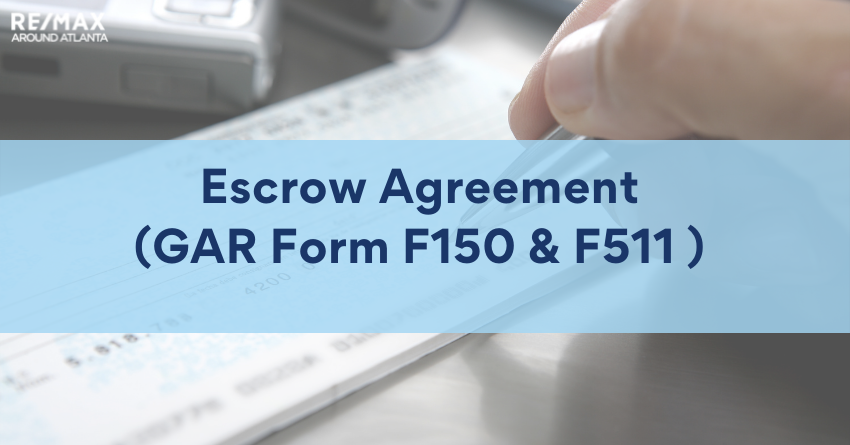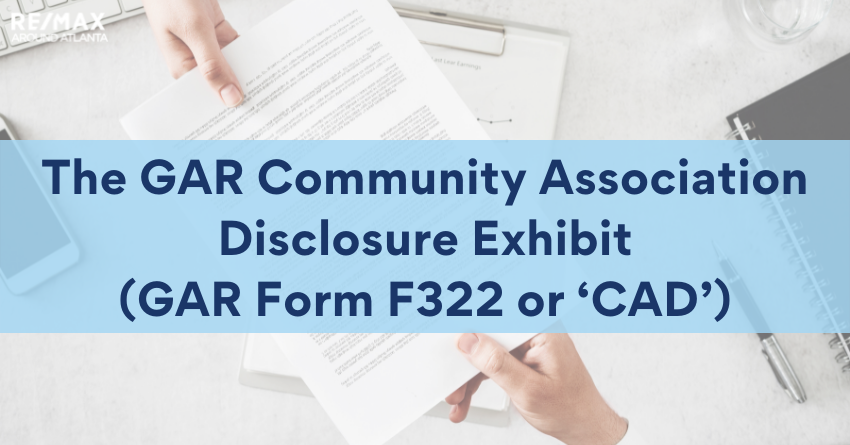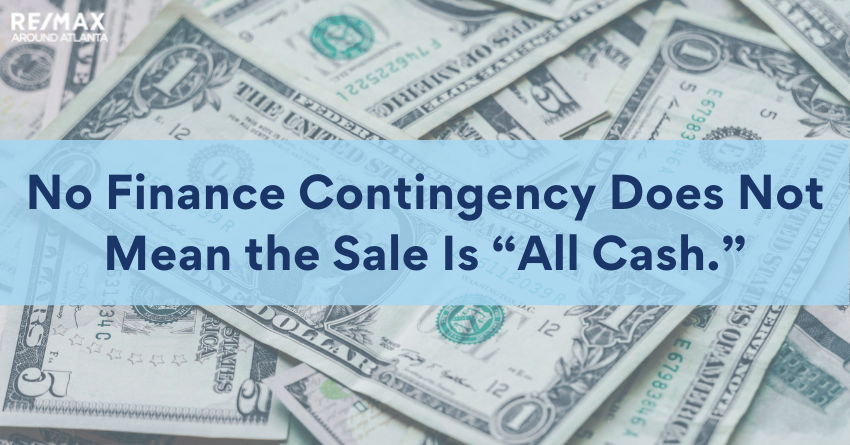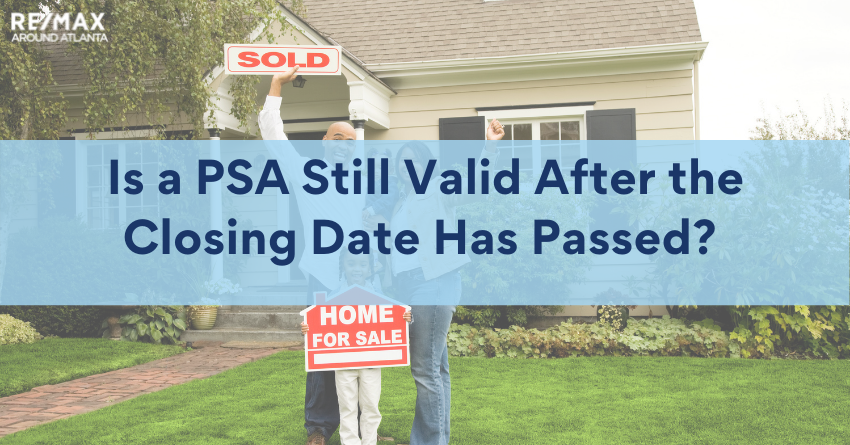|
Closing Attorney Acting as Holder of Earnest Money (GAR F510) and Agreement of Closing Attorney to Serve as Holder of Earnest Money (GAR F511), also referred to as an Escrow Agreement In the GAR Contract, if the buyer and seller want the closing attorney to hold the earnest money, they sign a form titled “Closing Attorney Acting as Holder,” which becomes an exhibit to the purchase and sale agreement. It is GAR Form 510. There is a required companion document in which the Attorney agrees to hold the earnest money, the Escrow Agreement (GAR F511). The 2 documents operate together. The 510 is attached to the purchase agreement and is signed by the Buyer and Seller. The 511 or Escrow Agreement is not attached to the purchase agreement. It is a separate agreement signed by the closing attorney agreeing to hold the funds.
Within two business days of the binding agreement date, the buyer is required to deliver to the closing attorney a copy of the fully signed and executed purchase and sale agreement with all exhibits, including the F510, and including the unexecuted F511 escrow agreement. The closing attorney must then agree to serve as the holder under all of the same conditions laid out in the purchase agreement. The closing attorney must then deliver notice of execution of the F511 to the buyer and seller within three business days of receiving notice that the closing attorney is desired as the holder. The notice method is generally the fully executed F511. What If the Closing Attorney Does Not Agree to Hold the Earnest Money? If the closing attorney does not agree and deliver the executed F511 back to the buyer and seller, then the F510 provides that the alternate holder named in the F510 will automatically become the holder instead. The alternate holder must be a broker in the transaction. Therefore, an alternate holder must be inserted into the F510 at section 7. If no alternate holder is inserted, the buyer’s agent is the default. When Do the Duties of the Escrow Holder Begin? The duties of the escrow holder do not begin until the closing attorney actually receives the purchase and sale agreement in which he is named as holder. The logic is that a holder should not be punished for failure to follow the terms of an agreement that he has potentially not yet even seen. Timeline
Potential for an Attorney’s Conflict of Interest in a Cash Transaction The GAR Purchase and Sale Agreement provides that the closing attorney will represent the lender in the transaction, but if there is no lender, then the closing attorney will represent the buyer. A particular area of concern arises when the closing attorney who is representing the buyer is also the holder of the earnest money in an all-cash transaction because, unlike real estate brokers and agents, attorneys owe fiduciary duties to their clients, and their role as the holder has the potential to result in a conflict of interest for the attorney. If there is a dispute and the attorney owes a fiduciary duty to the buyer, the attorney must disburse the funds back to the buyer, if there is any reasonable basis for doing so. The seller may well object to this, however, since as the holder of the earnest money, the attorney is required to be neutral and make an objective determination. The holder may well feel that under these facts the buyer is in breach and that the funds should be paid to the seller. But how can the attorney make such a call when doing so is against the best interests of his buyer client? The GAR contract resolves this conflict issue by requiring the Holder to interplead the funds. Therefore, in a cash transaction, consider having one of the brokers in the transaction hold the earnest money rather than the closing attorney.
0 Comments
“From your friendly neighborhood lenders over at the Mooreteam
The back to school lull in volume seems to be over and we are seeing increased intensity again in purchase sales. The FED keeps talking about tapering their purchases of the Mortgage Backed Securities and that is expected to happen before the end of the year. That means rates are going up soon. There is no better time to purchase a home than right now. Soon rates will be back in the upper 3’s and into the 4’s again. Historically those are great rates but if you can score a home with a rates in the upper 2’s or lower 3’s… why not. Now is the time. Refinancing, especially cash out refinancing, is also hot right now. Homeowners have more equity in their homes and with rates so low, it makes sense to leverage the equity for renovations, paying down expensive debt, or home maintenance. We are here to help! The GAR Purchase and Sale Agreement aggregates the disclosures and agreements relating to the community association into one exhibit, the Community Association Disclosure Exhibit (“CAD”).
Who Pays for What in the CAD The seller generally pays for the following things: 1) the closing letter 2) all amounts assessed against the property that come due before the closing, including both regular and special assessments 3) any move out fees and other fees designated by the community association as a seller fee 4) any transfer, initiation and administrative fees that the seller has not fully disclosed to the buyer (or which increase after the seller has initially disclosed this amount to the buyer) 5) any special assessments that have been adopted or are under consideration that have not been fully disclosed by the seller to the buyer. Seller Obligated to Pay All Assessments Owing Through Closing The seller is obligated to pay all assessments against a property owing through closing in order to convey good title to the buyer. This includes all recurring assessments owing through the closing. These are normally annual assessments that are paid in intervals established by the community association such as monthly, quarterly, or semi-annually. For example, if an assessment is $1,200 per year and is due in monthly installments of $100 per month and a property closes halfway through the year, the first six months of assessments would be paid by the seller, and the second six months of assessments by the buyer. The point is that assessments are prorated through the closing. Assessments can include late fees, fines, court costs, interest and attorney’s fees charged against a property. It is critical that the assessment amount is completed correctly. The form calls for the annual assessment and the number of installments. If the seller completes the document with the monthly assessment amount, for example, the Seller will have the pay 11 months for the buyer because the annual amount was not properly disclosed. Special Assessments Paid in Installments Some special assessments may be paid in installments while others must be paid at once. The due date for the special assessment will determine what must be paid by the date of closing. If a special assessment is due in installments, some of which come due before the closing and some of which come due after the closing, the installments coming due before the closing would all be the obligation of the seller to pay. Most special assessments are technically due in full when they are passed, but no late fees or penalties are imposed if the owner timely makes all permitted installment payments. When installment payments are permitted by the community association, those installments coming due prior to the closing are the responsibility of the seller and those installments coming due after the date of closing are the responsibility of the buyer. Seller Pays for Seller Clearance Letter Under the CAD, the seller is obligated to pay the cost of any association account statement, clearance letter or closing letter. This letter normally details all amounts owing to the community association through a specified date on the letter and is used to help a seller convey clear title to a property to a buyer. In some instances, the closing letter will only be issued by the community association as part of a package, where other amounts must also be paid to get the closing letter. So, for example, a community association might charge $500 to issue a clearance letter and to provide other documents to the seller at the same time. If the clearance letter will only be issued in a package of documents or other information, information, the seller is required to pay whatever amount is necessary to get the package of documents or information, including the clearance letter. Buyer Pays for Transfer, Initiation and Administrative Fees That Are Fully and Accurately Disclosed Under the CAD, the buyer pays all transfer, initiation, and administrative fees that have been accurately and fully disclosed to the buyer. “Transfer, initiation and administrative fees” is a defined term in the GAR Community Association Disclosure Exhibit and includes: “. . . any initiation fee, capital contribution, new member fee, transfer fee, new account set-up fee, fees similar to the above but which are referenced by a different name, one-time fees associated with the closing of the transaction and fees to transfer keys, gate openers, fobs and other similar equipment. Advance assessments due at Closing for a period of time after Closing, shall not be Transfer, Initiation and Administrative Fees and shall be paid by Buyer.” It is critical that the Seller accurately disclose these fees in the CAD. If the Seller does not and fees in excess of the agreed amount are due, the Seller has to pay them. See 3.C on page 3 of the CAD. If the buyer wants the seller to make a contribution to transfer, initiation and administrative fees, a Special Stipulation can be used. The Seller Pays for Transfer, Initiation and Administrative Fees Above an Agreed Amount Transfer, initiation and administrative fees need to be accurately disclosed by the seller to the buyer. One problem that arises in this area is that sometimes a fee will increase from the time it is initially disclosed to the buyer. In other cases, the seller may forget to disclose a fee. The (CAD) provides that the buyer pays up to a maximum fill-in-the-blank amount for transfer, initiation, and administrative fees. The seller then pays all transfer, initiation, and administrative fees above this amount, regardless of why. So, for example, let’s say that the buyer and seller agree in the CAD that the buyer will pay a maximum of $1,000 for transfer, initiation and administrative fees. The community association then increases the fees to $1,400. In this case, since the maximum amount the buyer is obligated to pay is $1,000, the seller is obligated to pay the additional Special Assessments If Seller Accurately Discloses Special Assessments Approved/Under Consideration If the seller accurately discloses in the GAR Community Association Disclosure Exhibit that a special assessment has passed or is under consideration, then the special assessment is paid for by the party who owns the property at the time the special assessment is due. In other words, if the special assessment is due prior to closing, the special assessment is paid by the seller. If the special assessment is due after closing, the special assessment is paid by the buyer. If a portion of the special assessment is due before and after closing, the buyer and seller would each pay their respective portions of the special assessment. Buyers have a general duty under Georgia law to exercise reasonable care to protect themselves against being defrauded. Buyers should try to independently verify whether a special assessment has been passed or is under consideration, since doing so will strengthen the buyer’s legal position by showing that the buyer exercised reasonable care to discover whether a special assessment was under consideration or approved. Another way buyers can demonstrate that they used reasonable care to determine if a special assessment is under consideration or has been approved is to include a special stipulation in their contracts. The special stipulation should require the seller to provide, provide, within the first five days or so of the commencement of the due diligence period, minutes of the meetings of the six most recent meetings of the board of directors of the community association. 5Surprise Special Assessments Arising After the Binding Agreement Date Who Should Pay? In some cases, notice of a large special assessment is often sent and approved after the Binding Agreement Date but prior to closing. What is the fair way to decide who should pay? The CAD includes a procedure, including a right to terminate under specific condition, where the parties pre-agree. See the CAD for details at F.iii (c). An amount above which the buyer has the right to terminate must be filled in. Source: Weissman, Seth. The Red Book on Real Estate Contracts in Georgia (pp. 768-777). 6th Edition 2021. Savvy sellers want as few conditions in a purchase and sale agreement as possible. An offer without a finance contingency is very tempting.
Savvy buyers want their offer to stand out from the competition. Although Buyers may not have the cash, they may be confident in their ability to get a loan. So, they omit a loan contingency to make their offer look better than any others. What Advice Do You Give to The Seller? An offer without a finance contingency is not the same as an all-cash offer. For the seller, it’s not as good as an offer that includes an all-cash sale exhibit, because the seller cannot ask for proof of funds. The all-cash sale exhibit requires proof of funds. If the buyer cannot provide proof of funds, the seller can terminate, and the buyer will be in default. Without that ability to see proof of funds, the seller may be forced to wait until closing day to learn if the buyer can deliver. So, the best advice is to have the seller to respond with a requirement of an “All Cash Sale” exhibit. Then the seller can get the information he needs. Can the Buyer still get a loan if there is not a finance contingency? Absolutely. The buyer can get a mortgage, but the purchase would not be contingent on getting it. If buyer fails to get a loan, the buyer must close in cash or be in default. What if an All-Cash Sale exhibit is included and the buyer reserves the right to get a mortgage, does the sale become contingent on getting the loan? No. The right to get a mortgage in an all-cash transaction does not create a loan contingency. Buyers acknowledge in all-cash exhibit that they have sufficient liquid assets to purchase the property for all cash. If a loan attempt fails, the buyer is still obligated to close for all cash or be in default. If the buyer has previously been approved for a loan and does not include a financing contingency, should the buyer include an all-cash exhibit? No. All cash means cash or assets that can be liquidated easily. That does not include loan proceeds. If an all-cash exhibit is included, the verification of funds clause kicks in and the buyer would need to prove that he has liquid funds to close. If the buyer can’t, the buyer would be in default and the seller is allowed to terminate. However, the seller can ask for an all-cash exhibit, as noted above. If the seller insists and the buyer needs loan proceeds to close, consider Special Stipulations that allow the buyer to provide a loan approval by a certain date. Is a Purchase and Sale Agreement Still Valid After the Closing Date Has Passed?
In most cases, the answer is YES! The contract is still valid, but one of the parties is likely in breach of the agreement. In Georgia, the Purchase and Sale Agreement (PSA) does not automatically expire if the sale does not close on the stated closing date, even if there is a “Time is of the Essence” clause in the contract. To effectively terminate, the non-breaching party must serve a notice of termination on the breaching party. The non-breaching party then has the remedies provided in the law and the PSA. (Note that the GAR PSA Remedies clause limits the remedies.) When a PSA is not automatically terminated and is still valid, a fully executed amendment to extend the closing date would also be valid. Once the date is extended, the defaulting party is no longer in default. Automatic Termination is Possible If the parties wish to provide for automatic termination when a closing date passes, additional contract language would need to be added as a special stipulation. “ In the event that a closing does not occur on or before the closing date as set forth in this Agreement, including any permitted extensions, then this Agreement shall automatically terminate and the non-defaulting party shall have the right to pursue all available claims at law or in equity against the defaulting party.” GAR 290 Agreement to Reinstate Contract. GAR recently added a new form to its arsenal that has created some confusion. GAR 290, Agreement to Reinstate Contract is to be used when the PSA was terminated by one or both of the parties and the parties now want to reinstate the Agreement. Accidental terminations happen. The above situation is a good example. Another example is including an automatic termination clause in an Amendment to Address Concerns. The parties may still be negotiating past the time to respond and, whoops, the automatic termination happens. Or the parties can intend a termination, later change their position and want to reinstate the PSA. In these cases, go to the Agreement to Reinstate Contract. |
RMAAReal Estate News, Brokers Blog & More Categories
All
Archives
July 2024
|






 RSS Feed
RSS Feed